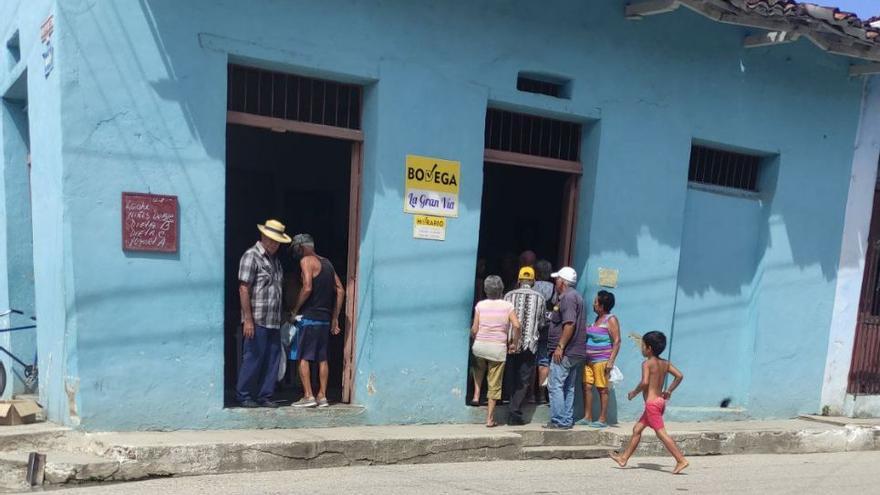
![]() 14ymedio, Mercedes García, Sancti Spíritus, 26 December 2023 — “It failed and failed until it stopped arriving,” this is how Nuria de las Mercedes describes the situation that the chronically ill patients of Sancti Spíritus have experienced with the supply of milk for medical diets. This December, for the second time in the year, consumers have been informed that the sale of dairy is suspended in state shops, and only the quota for children up to seven years old and pregnant women will remain.
14ymedio, Mercedes García, Sancti Spíritus, 26 December 2023 — “It failed and failed until it stopped arriving,” this is how Nuria de las Mercedes describes the situation that the chronically ill patients of Sancti Spíritus have experienced with the supply of milk for medical diets. This December, for the second time in the year, consumers have been informed that the sale of dairy is suspended in state shops, and only the quota for children up to seven years old and pregnant women will remain.
Nuria, 74 years old, is diabetic, hypertensive and has kidney problems. Among the chronic patients who receive a liter of milk every three days, the elderly woman is in group C of the three groups [A, B and C], where beneficiaries are grouped according to their condition. “In recent months it was delayed, it was even weeks since it had arrived, and now we were told that they can’t guarantee it,” she tells this newspaper.
“They haven’t explained if it’s forever or a temporary measure,” complains the woman from Sancti Spíritus. Along with other customers who buy the rationed milk, Nuria is part of a WhatsApp group where information about the supply is shared. “In the group no one has explained about what’s going on, but now they’ve told me in the shop that it wasn’t coming.”
The state employees don’t offer a conclusive explanation. “We are in the season when traditionally there is less rain, less feed and less milk
The state employees don’t offer a conclusive explanation. “We are in the season when traditionally there is less rain, less feed and less milk,” an employee in the Kilo 12 district tells this newspaper. “At the beginning of the year the same thing happened, and then we went back to selling, although it has never returned to a normal or stable distribution.”
Last March, the local press announced that the sale of milk destined for medical diets was suspended. The announcement explained that it was a momentary measure and that the authorities of the territory had decided to “protect the allocations directed to children and pregnant women.”
Alberto Cañizares Rodríguez, director of the Río Zaza Dairy Products Company in the province, explained that the main reason for the cutback was the lack of animal feed and added that the country had not been able to import “the required levels of milk powder” to ensure coverage for chronically ill people.
However, this newspaper was able to confirm that last November, 50 tons of powdered milk expired in the provincial warehouses of Río Zaza. “It was not sold to the population and not distributed by another way, so they saw the merchandise had already expired and could not be marketed,” an employee of the company told 14ymedio at the time.
The bosses were furious when they found out and came here to try to break the chain on the weakest link
“The bosses were furious when they found out and came here to try to break the chain on the weaker link – that is, to blame us – but the responsibility was theirs, because they told us to hold onto the product, and they did not take into account the expiration date. It was imported milk, and sometimes it is bought with little time left because that way it is cheaper on the international market.”
“Then they took samples of the milk to see if at least they could allocate it to some social program in which people can’t see the label (with the expiration date), but here that type of product suffers a lot from the heat,” he explains. “When the date expires, it usually already has a stale taste or has lost qualities to mix well with water, for example.” The product is still in the company’s warehouses.
For chronic patients, it remains for Río Zaza to process the flavored soy milk to cover the food deficit, but the product does not enjoy good acceptance and, for diabetics such as Nuria de las Mercedes, “it is more of a curse than a help because they add a lot of sugar, and it comes with dyes that are not recommended for those who have kidney problems.”
Until the beginning of 2023, Sancti Spíritus had been the only Cuban province that maintained the sale of milk for medical diets. Its status as a livestock territory assured it of the distribution, but “the year started badly and ends worse,” says Nuria. The illegal slaughter of cattle, the lack of grass in the fields and state laziness seem to be combined so that a glass of milk will not arrive on the tables of these patients in the coming months.
Translated by Regina Anavy
____________
COLLABORATE WITH OUR WORK: The 14ymedio team is committed to practicing serious journalism that reflects Cuba’s reality in all its depth. Thank you for joining us on this long journey. We invite you to continue supporting us by becoming a member of 14ymedio now. Together we can continue transforming journalism in Cuba.
